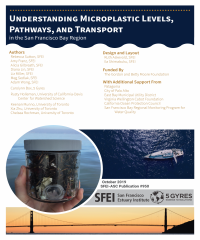Sutton, R.; Lin, D.; Sedlak, M.; Box, C.; Gilbreath, A.; Holleman, R.; Miller, L.; Wong, A.; Munno, K.; Zhu, X.; et al. 2019.
Understanding Microplastic Levels, Pathways, and Transport in the San Francisco Bay Region. SFEI Contribution No. 950. San Francisco Estuary Institute: Richmond, CA.
 Microplastics (particles less than 5 mm) are ubiquitous and persistent pollutants in the ocean and a pervasive and preventable threat to the health of marine ecosystems. Microplastics come in a wide variety of shapes, sizes, and plastic types, each with unique physical and chemical properties and toxicological impacts. Understanding the magnitude of the microplastics problem and determining the highest priorities for mitigation require accurate measures of microplastic occurrence in the environment and identification of likely sources.
Microplastics (particles less than 5 mm) are ubiquitous and persistent pollutants in the ocean and a pervasive and preventable threat to the health of marine ecosystems. Microplastics come in a wide variety of shapes, sizes, and plastic types, each with unique physical and chemical properties and toxicological impacts. Understanding the magnitude of the microplastics problem and determining the highest priorities for mitigation require accurate measures of microplastic occurrence in the environment and identification of likely sources.
To develop critical baseline data and inform solutions, the San Francisco Estuary Institute and the 5 Gyres Institute have completed the first comprehensive regional study of microplastic pollution in a major estuary. This project supported multiple scientific components to develop improved knowledge about and characterization of microparticles and microplastics in San Francisco Bay and adjacent National Marine Sanctuaries, with the following objectives:
- Contribute to the development and standardization of sample collection and analysis methodology for microplastic transportation research.
- Determine a baseline for future monitoring of microplastics in San Francisco Bay surface water, sediment, and fish, and in ocean waters outside the Golden Gate.
- Characterize pathways by which microplastics enter the Bay, including urban stormwater and treated wastewater effluent.
- Investigate the contribution of Bay microplastics to the adjacent National Marine Sanctuaries through computer simulations.
- Communicate findings to regional stakeholders and the general public through meetings and educational materials.
- Facilitate evaluation of policy options for San Francisco Bay, with recommendations on source reduction.
This document presents the findings of this three-year project. A companion document, “San Francisco Bay Microplastics Project: Science-Supported Solutions and Policy Recommendations,” has been developed by 5 Gyres using the findings of this study (Box and Cummins, 2019).